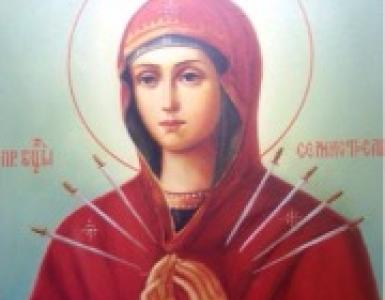City action “Literary Change”. City event “Literary Change” Competition nominations and publication restrictions
Appendix No. 7
to the position
about the city educational campaign
“My choice is the future of Russia!”
Regulations on the “Literary Change” campaign
- General provisions
In order to create conditions for introducing students to Russian classical literature, attracting public attention to the need to revive the culture of reading, revealing creative potential students by the Department of Education of the Lipetsk city administration, gymnasium No. 12 within the framework of the “Heritage” project (direction “ Personal development") the action "Literary Change" (hereinafter referred to as the Action) is being held.
- Objectives of the Promotion
Main objectives of the Promotion:
- involve children and adolescents in active creative activity;
— create favorable conditions for identifying gifted schoolchildren in the field of artistic expression;
— improve the reading culture of students;
— to popularize reading among participants in educational relations and residents of the city of Lipetsk
3.Participants
All participants in educational relations: students (including pupils of preschool institutions), teachers, and parents can take part in the Promotion.
- Contents and procedure of the Promotion
The promotion is held throughout the academic year in accordance with the calendar significant dates, related to the life and work of famous Russian authors (magazine “Bulletin of Education” No. 14, 2017, “Calendar educational events, dedicated to state and national holidays Russian Federation, memorable dates and events Russian history and culture, for the 2017-2018 academic year"). For example, October 8 is the 125th anniversary of the birth of M.I. Tsvetaeva, January 25 is the 80th anniversary of the birth of V.S. Vysotsky, March 28 is the 150th anniversary of the birth of M. Gorky, etc.)
The promotion includes three seasons:
— “Literary autumn”;
— “Literary winter”;
— “Literary spring.”
Educational institutions taking part in the Promotion choose a memorable literary date (or several dates) associated with the name of a famous Russian writer each season. An artistic reading of a work written by a given author by one or more participants in educational relations (students, teachers, parents (legal representatives)) is recorded on video. The video can be filmed during a school break, in a city park, public transport etc.
- Summarizing
The most active participants of the Action will be awarded diplomas (letters) from the Department of Education of the Lipetsk City Administration.
One of the main goals of education is to teach children to evaluate information critically. But can teachers themselves do this? As practice shows, this is not always the case. Educational psychologist Kirill Karpenko has formulated rules that will allow you to recognize fake or erroneous information.
The topic of teenage suicide is one of the most pressing and difficult in Russia. This applies especially to teachers, because adolescence They worry about their students more than once. How he assesses the current situation modern science, says Vsevolod Rozanov, professor of the Department of Health Psychology and Deviant Behavior, Faculty of Psychology, St. Petersburg State University.
For ten years now, one of the schools in the north of Karelia has been living as an innovation platform. Each lesson here lasts 90 minutes. There is no traditional class schedule, but there is a feed. During this time, teachers learned to see the child and build an individual route for each student. Physics teacher Nadezhda Deribina explains how the unusual learning process works.
Polina Dashkova's new novel "Gorlov's Dead End" became one of the bestsellers this fall. In it, the writer turned to history: the events of the 50s and 70s are unexpectedly refracted in the fates of her heroes after a while. IN exclusive interview The author told Teacher's Newspaper about working on historical prose and why she would never write a children's book.
One of the main goals of education is to teach children to evaluate information critically. But can teachers themselves do this? As practice shows, this is not always the case. Educational psychologist Kirill Karpenko has formulated rules that will allow you to recognize fake or erroneous information.
The topic of teenage suicide is one of the most pressing and difficult in Russia. It especially concerns teachers, because they experience their students’ adolescence more than once. Vsevolod Rozanov, professor of the Department of Psychology of Health and Deviant Behavior of the Faculty of Psychology at St. Petersburg State University, talks about how modern science assesses the current situation.
For ten years now, one of the schools in the north of Karelia has been living as an innovation platform. Each lesson here lasts 90 minutes. There is no traditional class schedule, but there is a feed. During this time, teachers learned to see the child and build an individual route for each student. Physics teacher Nadezhda Deribina explains how the unusual learning process works.
Polina Dashkova's new novel "Gorlov's Dead End" became one of the bestsellers this fall. In it, the writer turned to history: the events of the 50s and 70s are unexpectedly refracted in the fates of her heroes after a while. In an exclusive interview with Teacher's Newspaper, the author spoke about working on historical prose and why she would never write a children's book.













